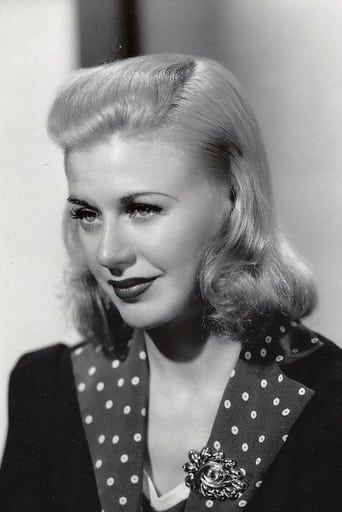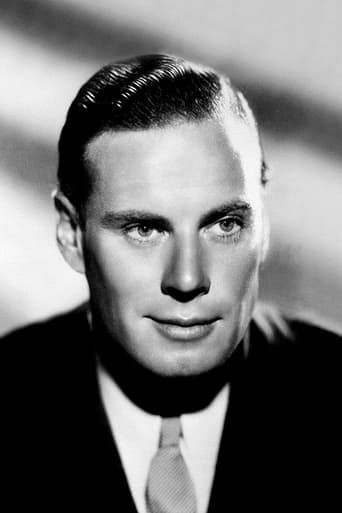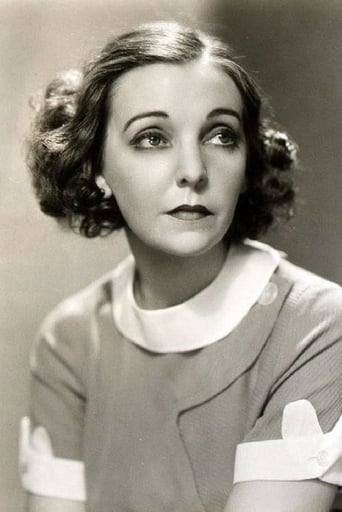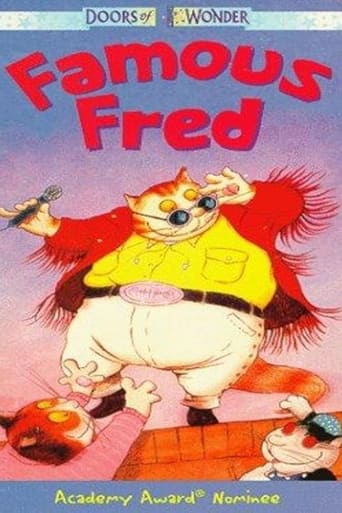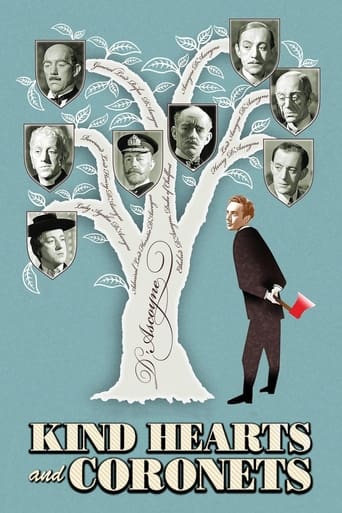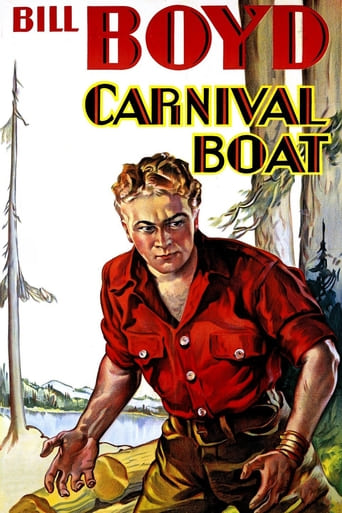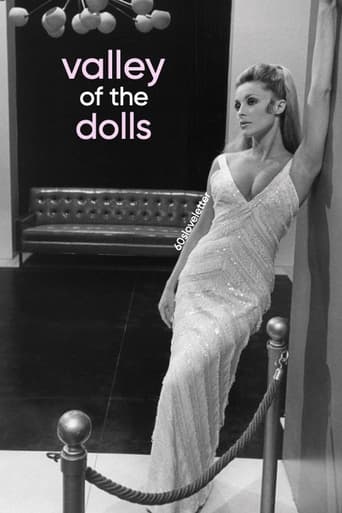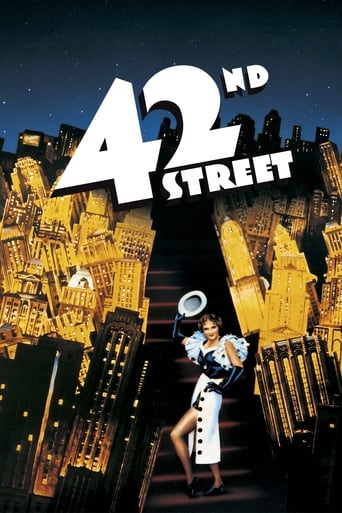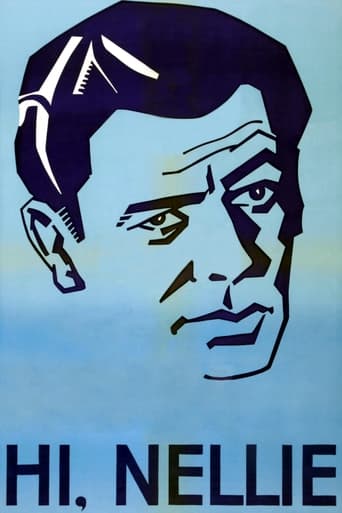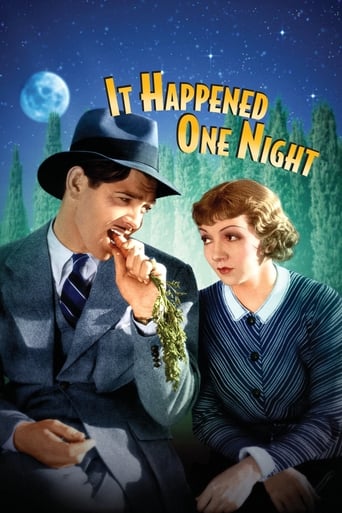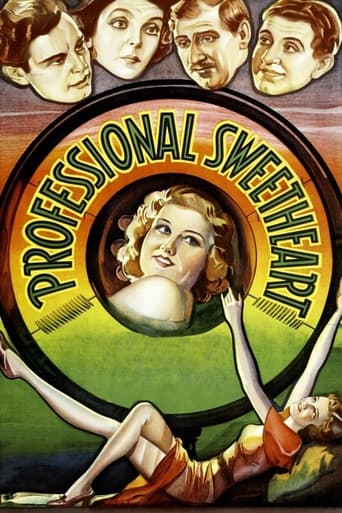
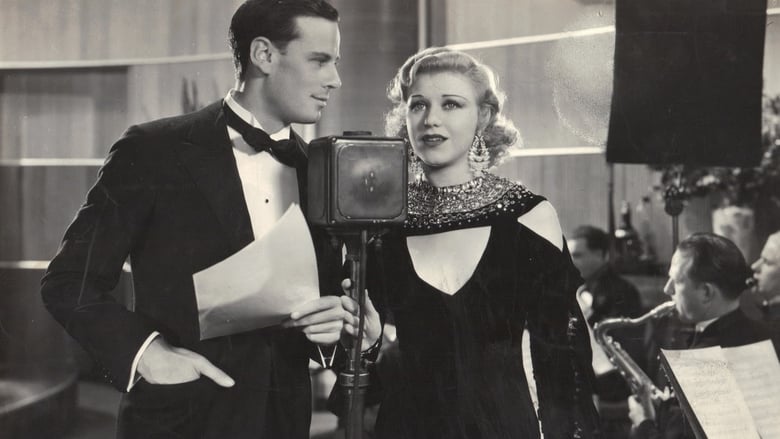
Professional Sweetheart (1933)
Radio singer Glory Eden is publicized as the ideal of American womanhood in order to sell the sponsor's product Ippsie-Wippsie Washcloths. In reality, Glory would like to at least sample booze, jazz, gambling, and men. When the strain of representing "purity" brings her to rebellion, the sponsor and his nutty henchmen pick her a public-relations "sweetheart" from fan mail, who turns out to be a hayseed.
Watch Trailer
Cast
Similar titles

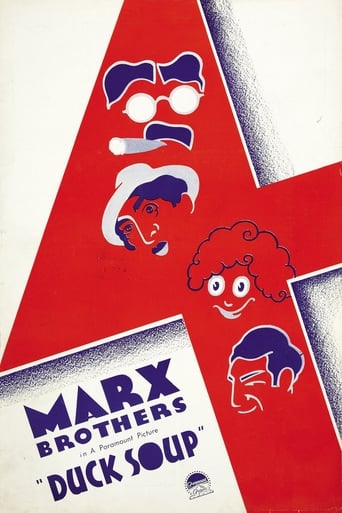
Reviews
A Masterpiece!
When a movie has you begging for it to end not even half way through it's pure crap. We've all seen this movie and this characters millions of times, nothing new in it. Don't waste your time.
A terrific literary drama and character piece that shows how the process of creating art can be seen differently by those doing it and those looking at it from the outside.
It's a feast for the eyes. But what really makes this dramedy work is the acting.
PROFESSIONAL SWEETHEART manages indirectly to be a historically important film of sorts. Flashy supporting roles in 42nd STREET and THE GOLD DIGGERS OF 1933 had brought Ginger Rogers to the attention of Hollywood, and Columbia and RKO at least were seriously thinking of signing her to a long term contract (most of her recent work had been done for Warner Brothers but they may have believed that, with Joan Blondell and Glenda Farrell among others already in their fold, there was little room left for a Ginger Rogers). RKO wound up inking her to a 3 film deal which amounted to one film plus a two film option at RKO's discretion. Thus PROFESSIONAL SWEETHEART served as an elaborate screen test for Rogers. It was a modest success both critically and at the box office (which was more than most 1933 films could say) and RKO signed her to a full 7 year contract. Ginger's first assignment under that contract was FLYING DOWN TO RIO and the rest was history.PROFESSIONAL SWEETHEART is a clear sign that RKO was very serious about Ginger Rogers. It's a pure vehicle for her comedic abilities, seen here as more 'hard sell' than they would be later on, and she's given every bit of support that could be realistically expected: A funny, sharp, broadly satirical script from the talented Maurine Watkins of CHICAGO fame, a terrific pack of supporting actors mostly imported from Warner Brothers, and about the best house director that RKO had (William Seiter) were assigned to the project. Ginger already had considerable experience as a supporting actress in big pictures and as a female lead in little pictures, but this was her first starring vehicle, and she makes the most of it.I'll refrain from running through the plot (if you're reading this surely you already know it) and restrict myself to a few observations. The chasm between a public persona and a private one is the obvious main theme, Glory's radio shtick as "the Purity Girl" being diametrically opposed to her portrayed private desires (a girl who wants to have 'fun fun fun', essentially). As in CHICAGO, the press can hardly be more cynical about it all while agreeably playing along with the act. Whether the public is actually fooled by this or is merely willing to tolerate the deceptions for its own amusement remains uncertain. This appears to be Watkins' One Big Idea, and she runs with it.Otherwise we get a broad satire of radio's inherent deceits, for example, audiences coached on their 'spontaneous' reactions; a nice skewering of the Progressive Eugenics Movement ("Hey, they're white, these Anglo-Saxons!" our naive business magnate from the Old Country notes in surprise); Harlem as a modern jazz-filled Valhalla ("I don't care what color he is as long as he takes me to Harlem!" Glory beams with a racial double entendre), barbed comments on lawyers, clothes designers doubling as interior decorators, business tycoons whose empires consist of washcloths and dishrags, the full gamut. Gregory Ratoff strikes me as very funny as the genius behind Ippsey- Wippsey Washcloths, ZaSu Pitts is excellent as a 'sob sister' whose interview style consists of her own meandering monologues, Franklin Pangborn, Allen Jenkins, Edgar Kennedy and Frank McHugh are solid in their roles, and Theresa Harris has a more substantial part than is usual for a black maid of the era (oddly, both she and Ginger Rogers, both competent singers in their own rights, get dubbed by Etta Moten). Norman Foster does what he needs to do as the country hick.And Ginger Rogers was on her way.
This wonderful cast interacts with absolute precision, whether walking around a room or interrupting each others' wisecracks. The script and direction meld into an enjoyable film. What's best is that not one character ever removes his tongue from his cheek. They know it's not serious and so do we. It's just pure fun.Some reviewers say the film is heavily gay; I beg to differ. While Pangborn gives a few swishes, it's not entirely clear which side of the street he walks on until near the end. There Pitts see him in his underwear, feigns surprise and then walks into his room and closes the door. The rest is left to our imagination, but gay isn't part of it.This is a film to see again and again to appreciate great plotting and directing.
"Professional Sweetheart" proved to be an important picture for Ginger Rogers. She had just left Warners and went over to RKO for what she thought was yet another unpretentious programmer - and it was, sort of, but the script poked satirical fun at radio sponsors and commercialized purity. Frank Nugent, of the New York Times, who had never shown much interest in Ginger, thought that she had rarely been so entertaining. RKO thought she had a future and placed her under contract and even though she was soon over at Poverty Row filming "A Shriek in the Night", they remembered her when Dorothy Jordan dropped out of "Flying Down to Rio", giving her her first screen teaming with Fred Astaire.Miss Glory Eden (Rogers) is the Purity Girl of the air - the girl beloved by "dwellers in Manhattan penthouses and country folk on Main Street". She is supposed to represent everything sweet and good but she is getting pretty fed up with her lifestyle - the food she is forced to eat is healthy and bland - no champagne, caviar or chocolate for her and she longs to kick up her heels in a real New York nightclub with sexy underwear and a slinky dress. She feels she had more freedom back in the orphan's home. More than anything else Glory wants a man - a playboy!!! "No second hand goods for you"!!! Gregory Ratoff declares - "you must have a virgin"!!! Yes he really does say that!! In the same scene Glory bemoans the fact that she wants to be like her girlfriend - the one who came to town, found a man, got a fur coat and even got into trouble!!! Glory says enviously "Yes, she even got into trouble - but I'm not even getting there"!!! Pretty racy dialogue - even for a pre-code!!They (all the wonderful stable of character actors - Zasu Pitts, Frank McHugh, Franklin Pangborn) organise a "date" for her with one of her many fans, a taciturn country boy, Jim Davey (Norman Foster) who is suspicious of city slickers!!! There is so much publicity about her country sweetheart that the press demand a wedding!! - which takes place broadcast coast to coast!! It is orchestrated to the last degree - even to how much applause there is to be and there is even a reference to television when the wedding gifts are described. Lucien Littlefield describes them as high class and elegant but in reality they are cheap and tasteless.When a rival sponsor appears on the scene Jim realises that Glory's dreams of a house in the country, a little white picket fence etc was all talk and once she knows that the new contract carries no clauses - she can smoke, drink, go to nightclubs and eat chocolate she is eager to sign but Jim has a trick or two up his sleeve. He takes her to the country and she starts to thrive - all the skills she learned as an orphan - cooking, cleaning etc she just loves!! But all her domesticity goes out the window when she learns her maid has taken over her singing duties on the radio and the public love her!!!This is a really fun movie, all the team of wacky funsters are in it and because there are quite a few there is no chance that their comedy gets too much or too labored. Apart from the few I have already mentioned there is also Allen Jenkins and Sterling Holloway.
"Professional Sweetheart" was Ginger Rogers' first film for RKO studios after she left Warner Bros., and with Allen Jenkins and Frank McHugh in the supporting cast it almost seems like a Warners film in exile. It's a marvelous movie, smart and funny, with a script by "Chicago" author Maurine Watkins that, though it isn't a crime story, takes up another of Watkins' favorite themes: media manipulation and the gap between what we're told about celebrities and what they're really like. In "The Fred Astaire and Ginger Rogers Book," Arlene Croce wrote, "Almost any Ginger Rogers role is successful to the degree that it reflects the dualism in her personality (tough-vulnerable, ingenuous-calculating) or plays on her curious aptitude for mimickry or fantasy or imposture." Croce was writing about the major roles of her post-Astaire career "Bachelor Mother," "Tom, Dick and Harry," "The Major and the Minor" but it applies here just as well; by casting Rogers as a wise-cracking hard-bitten orphan girl forced to pose as the "Purity Girl," and having two radio sponsors and a husband (from an arranged marriage!) all with their own ideas of what they want from her, "Professional Sweetheart" gives Rogers an early showcase for the characteristics that would have made her an enormous star even if she'd never set foot on a dance floor with Fred Astaire. I can't understand why some of the other commentators on this film have criticized Watkins' script, since it seems to me to be well constructed and vividly satirical on celebrity and its discontents in a way that rings true even today.Another thing I liked about "Professional Sweetheart" is that it's one of the Gayest movies Hollywood ever made so much so that I can't understand why TCM isn't showing it in their current "Screened Out" festival of Gay and Lesbian films when some other titles with much more peripheral Gay content did make their list. The supporting actors seem to be competing as to who can be the queeniest, with Franklin Pangborn (not surprisingly) winning: his looks of horror and disgust when any of the other characters suggests that he date a woman are priceless. Also pretty astonishing, even for the relatively liberal "pre-Code" era in Hollywood history, is Sterling Holloway's obviously cruising Allen Jenkins at the reporters' reception imagine a Gay scene involving Jenkins in which he's the butch one!
